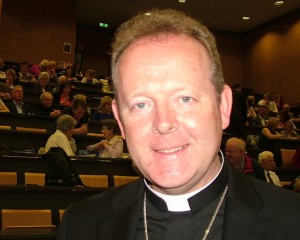
By Sarah Mac Donald - 04 May, 2016

Archbishop Eamonn Martin, Primate of All Ireland
The Primate of All Ireland has highlighted that social networks can facilitate relationships and promote the good of society, but they can also lead to further polarisation and division between individuals and groups.
As the chair of the Council of Communications of the Irish Catholic Bishops’ Conference, Archbishop Eamon Martin of Armagh welcomed the Pope’s message for the 50th World Day of Social Communications which is celebrated on Sunday 8 May 2016, the Solemnity of the Ascension of the Lord.
Pope Francis has chosen Communication and Mercy: A Fruitful Encounter as the theme for 2016.
One of the key points he makes is that it is not technology which determines whether or not communication is authentic, but rather the human heart and our capacity to use wisely the means at our disposal.
The message also warns of social networks’ potential for good and bad.
“As this Extraordinary Jubilee Year of Mercy continues to unfold through initiatives in Rome and at home, I warmly welcome this year’s World Communications Day message,” Archbishop Martin said in a message on Tuesday.
He said such guidance was timely for society in Ireland, as well as for families, communities and States around the world.
“It complements this special year for the Universal Church which, Pope Francis tells us in his message, ‘is called to practise mercy as the distinctive trait of all that she is and does … Our primary task is to uphold the truth with love’.”
“We are also reminded that to communicate in an authentic manner we must be able to ‘listen’ to, rather than merely ‘hear’, when we encounter another,” the Primate of All Ireland stated.
He continued, “In part this year’s message follows–on from Communicating the Family: A Privileged Place of Encounter with the Gift of Love of 2015, as it asks us to show mercy and tolerance within our families and ‘to build bridges, to enable encounter and inclusion’ with words of love.”
But, he stressed, the reach of Communication and Mercy goes much wider as it urges politicians and diplomats to use language ‘inspired by mercy, which never loses hope’.
He encouraged everyone to read the short, “thought provoking and inspiring message” for World Communications Day.
Some of the key points from this year’s message are:
· If our hearts and actions are inspired by charity, by divine love, then our communication will be touched by God’s own power.
· As sons and daughters of God, we are called to communicate with everyone, without exception.
· Christians ought to be a constant encouragement to communion and, even in those cases where they must firmly condemn evil, they should never try to rupture relationships and communication.
· Our political and diplomatic language would do well to be inspired by mercy, which never loses hope.
· Mercy can help mitigate life’s troubles and offer warmth to those who have known only the coldness of judgement. May our way of communicating help to overcome the mind-set that neatly separates sinners from the righteous. We can and we must judge situations of sin – such as violence, corruption and exploitation – but we may not judge individuals, since only God can see into the depths of their hearts.
· Our primary task is to uphold the truth with love.
· Listening is never easy. Many times it is easier to play deaf. Listening means paying attention, wanting to understand, to value, to respect and to ponder what the other person says.
· It is not technology which determines whether or not communication is authentic, but rather the human heart and our capacity to use wisely the means at our disposal. Social networks can facilitate relationships and promote the good of society, but they can also lead to further polarisation and division between individuals and groups.
· I pray that this Jubilee Year, lived in mercy, may open us to even more fervent dialogue so that we might know and understand one another better; and that it may eliminate every form of closed-mindedness and disrespect, and drive out every form of violence and discrimination.
· In a broken, fragmented and polarised world, to communicate with mercy means to help create a healthy, free and fraternal closeness between the children of God and all our brothers and sisters in the one human family.
A special feature on World Communications Day is now available on www.catholicbishops.ie which includes: the full text of the Pope’s message; Prayers of the Faithful; Prayers for Communicators and the Media; A Social Media Prayer; Quotes on communications in marriage and the family from Pope Francis, taken from his Apostolic Exhortation Amoris Laetitia; information on the official World Communications Day hashtag which is #ComMisericordia50; and 10 tips for those engaging on the digital highway.